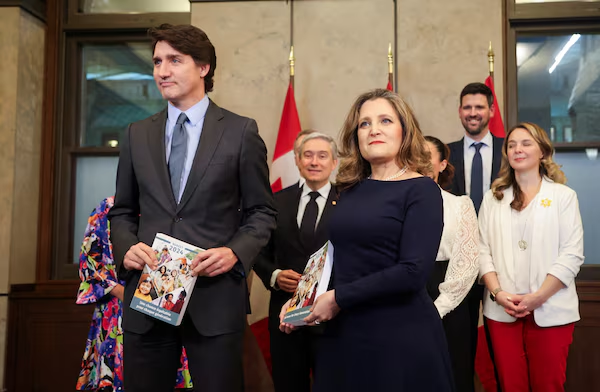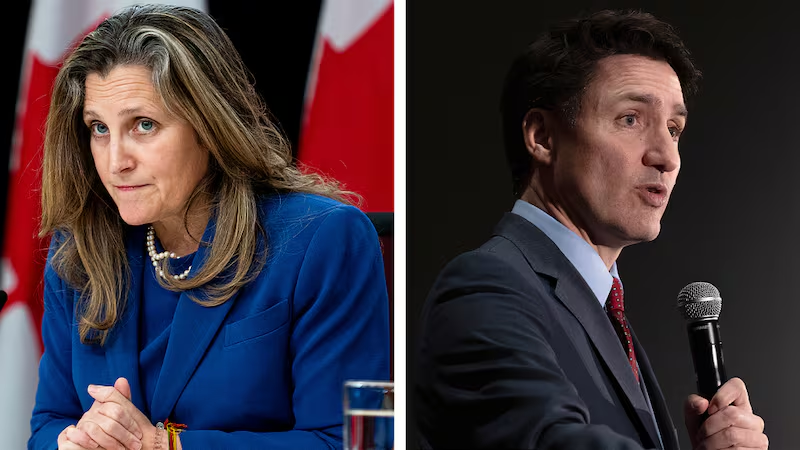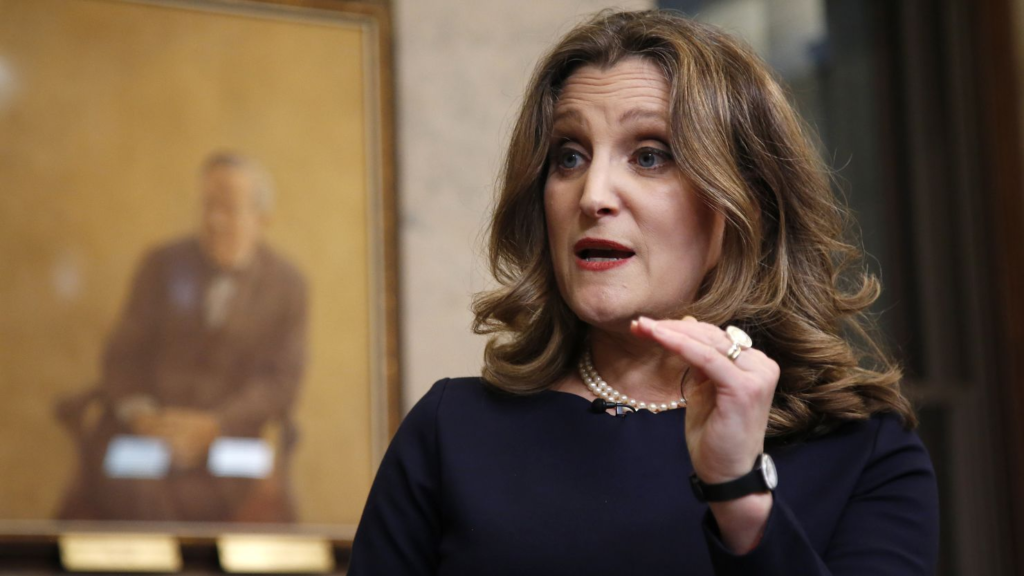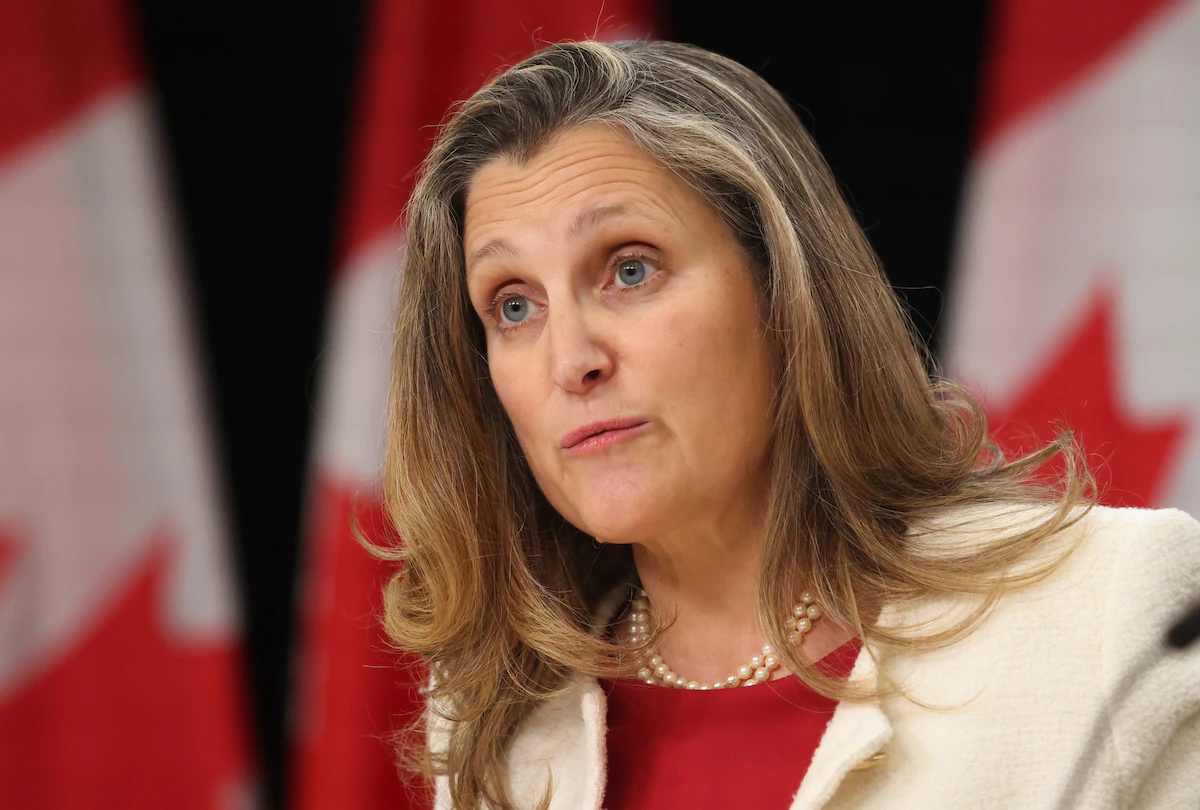Canada Finance Minister Chrystia Freeland Resigns in a surprising move that has sent shockwaves through the nation’s political landscape.
Her decision to step down comes amid growing tensions with Prime Minister Justin Trudeau over how to respond to the United States’ looming tariff threats under President-elect Donald Trump.
Freeland, a key member of Trudeau’s cabinet and widely seen as a potential successor, cited serious differences in economic strategy as the reason for her departure. This resignation marks a critical turning point for Trudeau’s leadership as he faces growing dissent and declining popularity among voters.
Freeland’s decision highlights an increasingly fractured government facing a turbulent economic and political environment. Her strong stance against Trump’s proposed tariffs underscores a deeper concern over Canada’s economic stability and the measures required to address the crisis.
The public resignation letter revealed internal conflicts between Freeland and Trudeau regarding Canada’s fiscal policy and the direction of the Liberal government, signaling a significant rift within the administration.
Canada Finance Minister Chrystia Freeland Resigns: A Breaking Point
At the center of Freeland’s resignation is Canada’s economic relationship with the United States. President-elect Donald Trump’s plan to impose 25% tariffs on Canadian imports posed a direct threat to Canada’s economy, with 75% of its exports relying on trade with its southern neighbor.
The looming tariff war forced the Canadian government to develop a unified strategy, yet differences of opinion between Freeland and Trudeau quickly became irreconcilable.
Freeland’s letter to Trudeau emphasized her belief that Canada must take Trump’s tariff threats “extremely seriously” and called for a fiscally disciplined approach.
Read : If We Are Subsidising Canada and Mexico, Let Them Become a States: Donald Trump
She strongly opposed what she described as “costly political gimmicks,” likely referring to Trudeau’s recent sales tax holiday. The policy, aimed at boosting the ruling Liberal Party’s political standing, was criticized for its financial burden on the government amid an already growing deficit.
Read : Car Theft Capital of the World: Canada Ranks First with One Car Stolen Every Five Minutes
Freeland argued for maintaining Canada’s fiscal “powder dry” in anticipation of a prolonged economic battle with the United States. She warned that engaging in politically motivated spending measures could weaken Canada’s position in negotiations and potentially exacerbate an economic downturn caused by Trump’s tariffs.

Trudeau, on the other hand, appeared to favor a more flexible approach, which reportedly included shuffling Freeland to another cabinet position. This disagreement reached a breaking point when Freeland rejected the reshuffle, concluding that resigning from the cabinet was the only “honest and viable path” forward.
Her departure not only highlights her dissent against Trudeau’s leadership but also raises concerns over Canada’s readiness to confront the escalating trade tensions.
Freeland’s Legacy: A Trailblazer in Canadian Politics
Chrystia Freeland’s political career has been marked by numerous achievements, making her resignation all the more significant.
A former journalist with a strong international profile, Freeland entered Canadian politics in 2013 and quickly rose to prominence within the Liberal Party. She joined Trudeau’s cabinet in 2015, assuming key roles such as Minister of International Trade and Minister of Foreign Affairs.
One of her most notable accomplishments was her leadership in renegotiating the United States-Mexico-Canada Agreement (USMCA), where she played a central role in securing favorable terms for Canada.
Her efforts during these trade negotiations solidified her reputation as a skilled diplomat and economic strategist capable of navigating complex international relationships.

As Canada’s first female Finance Minister, Freeland broke barriers and was widely regarded as a strong candidate to succeed Trudeau as Liberal Party leader. Her tenure as Finance Minister, however, was marked by significant challenges, including managing Canada’s economic response to the COVID-19 pandemic and addressing a growing fiscal deficit.
Freeland’s resignation represents a significant loss for Trudeau’s government, as she was not only a key player in Canada’s economic policymaking but also one of his most trusted allies.
Her departure signals a potential leadership vacuum within the Liberal Party and raises questions about Trudeau’s ability to maintain unity within his cabinet.
The public reaction to Freeland’s exit has been mixed. While some have praised her for taking a principled stand on Canada’s economic future, others have criticized her decision to step down during a critical period.
Political analysts suggest that Freeland’s departure could weaken the Liberal government’s ability to respond effectively to Trump’s tariff threats and other economic challenges.
Trudeau’s Leadership Under Pressure
Chrystia Freeland’s resignation has added fuel to the fire for Prime Minister Justin Trudeau, who is already facing significant political pressure.
Recent polls show Trudeau’s Liberal Party trailing the opposition Conservative Party, led by Pierre Poilievre, by a staggering 20 points. Poilievre has repeatedly attempted to force a snap election, accusing Trudeau’s government of mismanagement and fiscal irresponsibility.
Freeland’s exit has exacerbated Trudeau’s political troubles, with critics pointing to her departure as evidence of a “crisis of confidence” within the government.
Political observers have noted that Trudeau’s inability to retain one of his most prominent cabinet members signals a weakening grip on his leadership and raises doubts about his ability to navigate the country through the current economic challenges.
Dalhousie University professor Lori Turnbull described Freeland’s resignation as a “total disaster” for Trudeau, suggesting that it undermines the prime minister’s credibility and leadership.

Similarly, University of Ottawa professor Genevieve Tellier noted that Freeland’s public rejection of Trudeau’s economic policies reveals deep fractures within the cabinet that could further destabilize the government.
Adding to Trudeau’s woes, Housing Minister Sean Fraser also resigned on the same day, citing similar frustrations within the cabinet. While Fraser’s resignation received less attention than Freeland’s, it reflects broader dissatisfaction among senior Liberal ministers.
In response to Freeland’s departure, Trudeau appointed Public Safety Minister Dominic LeBlanc as the new Finance Minister. LeBlanc, a long-time ally of Trudeau, faces the daunting task of leading Canada’s response to Trump’s tariff threats while addressing a ballooning deficit.
His appointment, however, has done little to quell concerns about Trudeau’s leadership, with many questioning whether LeBlanc has the experience and credibility to fill Freeland’s shoes.
A Turning Point for Canadian Politics
Chrystia Freeland’s resignation marks a significant turning point for Canada’s political landscape. Her departure has not only exposed internal divisions within Trudeau’s government but also underscored the growing challenges facing the Liberal Party as it prepares for the next federal election.
For Trudeau, Freeland’s resignation represents a major blow to his leadership and credibility. As one of his closest allies and most capable ministers, Freeland’s exit raises serious questions about Trudeau’s ability to retain the confidence of his cabinet and party members.
With the Conservative Party gaining momentum and Trump’s tariff threats looming large, Trudeau faces an uphill battle to rebuild trust and rally his government ahead of the next election.
Freeland’s decision to resign rather than compromise on her economic principles has earned her praise from supporters who view her as a leader willing to take a stand during difficult times.
Her departure, however, leaves the Liberal Party in a precarious position, with no clear successor to Trudeau and mounting pressure to address the country’s economic and political challenges.
The road ahead for Canada remains uncertain as the country grapples with the dual challenges of economic instability and political fragmentation.

With Freeland out of the picture, Trudeau must work quickly to restore unity within his government and develop a cohesive strategy to counter Trump’s tariff threats. Failure to do so could further erode public confidence in his leadership and pave the way for a Conservative victory in the next election.
As for Freeland, her political future remains unclear. While she has expressed her intention to seek reelection, her departure from the cabinet has fueled speculation about her long-term ambitions.
Some analysts believe she could reemerge as a leadership contender in the future, while others suggest she may take a step back from politics altogether.
In the immediate aftermath of Freeland’s resignation, the focus now shifts to Trudeau and his ability to steady the ship. With growing dissent within his cabinet and the opposition gaining ground, Trudeau’s leadership will be put to the test in the coming months. Whether he can weather this storm and hold his government together remains to be seen.

